DJI Action 2 vs HERO 10 Black: today's top action cameras compared
The DJI Action 2 shakes up action cam design while the GoPro HERO 10 Black keeps things traditional – but which is right for you?

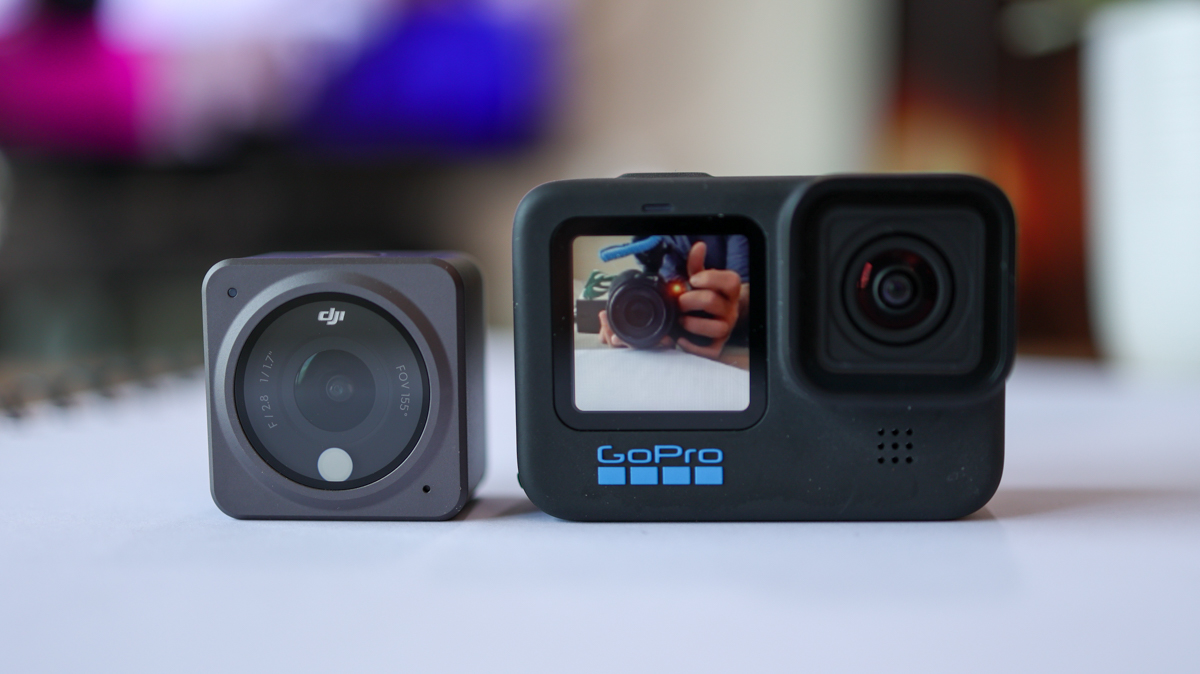
The DJI Action 2 and GoPro HERO 10 Black are two of the best action cameras out now. Having launched within a few weeks of one another in 2021, they both upgrade their line's video capture credentials, pack unique features – and after their 2022 software updates, enjoy boosted image quality, accessory compatibility and modes.
Both action cams sport totally different designs, with DJI opting for a truly modular system, complete with blasted metal and premium styling. The body of the camera is tiny, and to get handy features like a front display for vlogging, you need to clip on an optional accessory. Meanwhile, GoPro's HERO 10 Black is virtually identical looking to the HERO 9 Black, and the HERO 8 Black before it, which means you get a front display on the core camera. You can buy mods for it, but the core experience isn't modular.
It isn't just the designs that are different. Everything from the cameras' mounting systems to their ultra-wide-angle field of view varies across the Action 2 and HERO 10 Black. But with both DJI and GoPro's offerings sitting within the same rough price bracket, they're without a doubt direct competitors. The H10 is the best GoPro you can buy, while the Action 2 currently tops our best GoPro alternative guide. So which is right for you? Read on for an in-depth DJI Action 2 vs HERO 10 Black comparison. (Or to see how another big player for 2022 measures up, explore our GoPro HERO 10 Black vs Insta360 ONE RS faceoff.)
DJI Action 2 vs HERO 10 Black: design and features
We've got to applaud DJI for making an action cam that breaks the mould. The Action 2 delivers modular design, and its core module is the epitome of simplicity. It has one button, a screen and a lens. This helps it wipe the floor with the HERO 10 Black when it comes to being compact and lightweight, though it isn't without its compromises.
To get the full DJI Action 2 experience – better battery life, a USB-C port and a microSD card slot, you need to clip a secondary element to the camera – a second display or battery dock, which latches on with magnetic mounting points.
So while GoPro's HERO 10 Black misses out on the Action 2's compact polish, it also enjoys a more all-in-one feature set – one simple (larger) unit, which sports everything from a memory card slot to a USB-C port, a front display and a removable battery.
So far, it's a pretty even race – design nerds and skinny jean fans, DJI all the way. Rugged all-in-one action cam lovers, GoPro edges ahead.
Get all the latest news, reviews, deals and buying guides on gorgeous tech, home and active products from the T3 experts
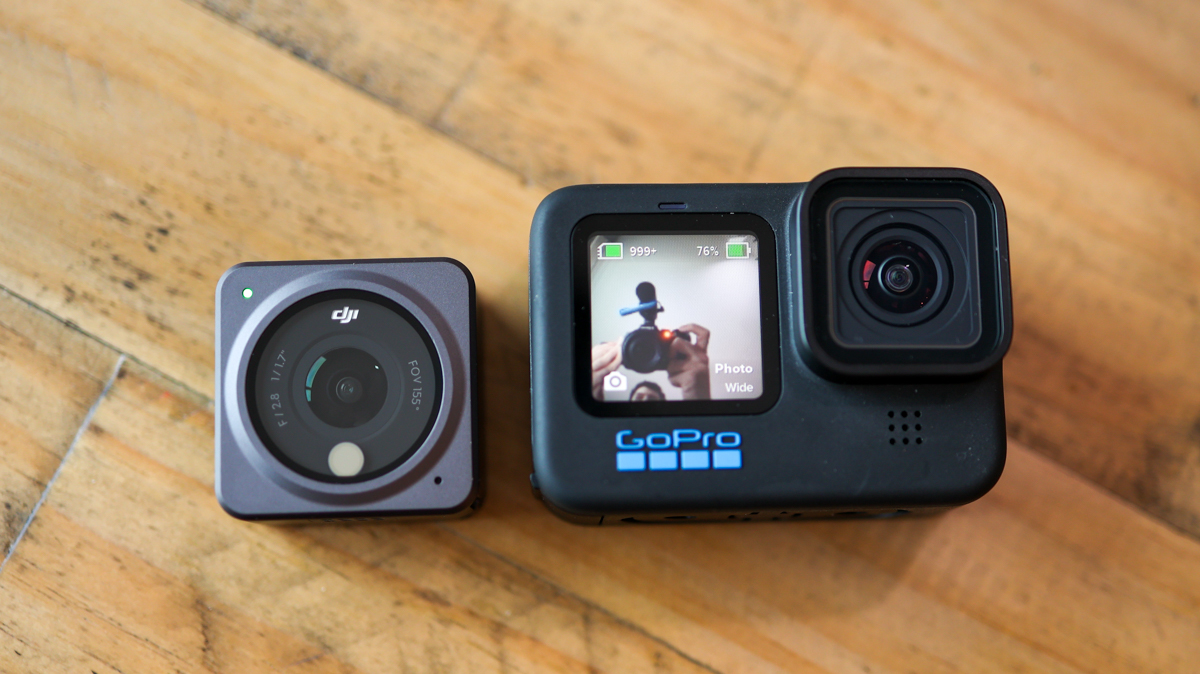
While both cameras shoot video at 4K resolution, 120fps, the GoPro HERO 10 Black gets a bit sharper at 5.3K – one point to GoPro. Its photo modes are also more extensive, and, as we'll come onto later, its footage is better quality. If you want the widest angle though, the Action 2's 155-degree field of view outperforms the HERO 10 Black's 132 degrees significantly – a point to DJI.
Horizon levelling is another excellent feature both cameras support. It prevents tilts from appearing in footage, so your videos look like they were shot perfectly level, despite the occasional slalom left or right. DJI and GoPro both support it (it's called Horizon Steady on the DJI Action 2), and DJI's horizon leveling is more extensive, so you can tilt more before throwing your framing into a tizz – another point to DJI.
DJI Action 2 vs HERO 10 Black: usability
Using either action cam is easy enough, once you get familiar with its respective interface, however, the extra screen size GoPro's HERO 10 Black offers makes it a fair bit easier to navigate than the DJI Action 2.
For quick recording, both cameras can launch straight into video recording mode from off. While the GoPro HERO 10 Black has a record button, so just tapping that does the job, the DJI Action 2 requires a feature called Snapshot to be activated. This starts recording every time you turn on the camera. On the plus side, it's faster to start recording – beating the GoPro by about two seconds. However, it left us with a lot of unwanted clips when we just wanted to turn the camera on without recording, so we kept it off most of the time.
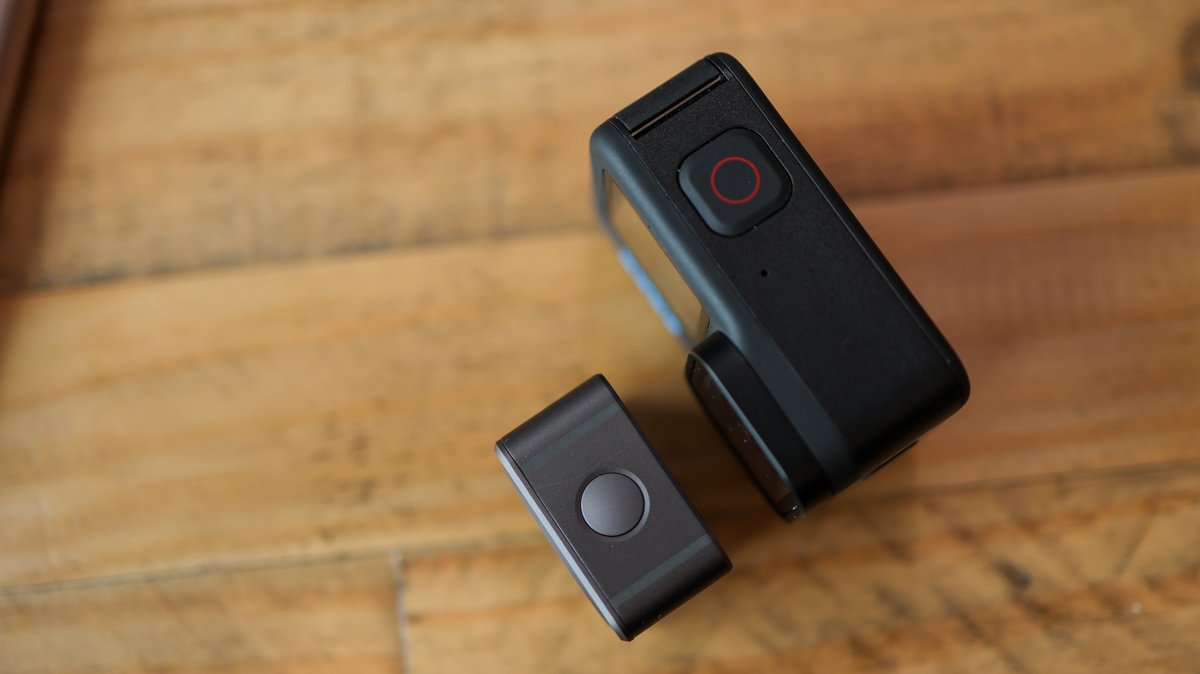
Then there's the issue of heat. Both cameras overheat, but the DJI Action 2's metal frame feels hotter to the touch, bordering on uncomfortable when filming 4K shots of more than a few minutes. It also shuts down quicker, so GoPro's HERO 9 Black was also able to record for slightly longer at high resolutions.
While neither will be used to film an epic movie from start to finish anytime soon, if you like long clips you should get a GoPro HERO 10 Black. The DJI Action 2 sports 32GB storage out of the box, beating the GoPro, which requires a microSD card, but the fact the HERO 10 Black won't shut down as quickly from overheating and can take a high-capacity memory card without any clip-on modules is a boon for filming long clips.
Onto the apps, and if you don't fancy fumbling through tiny screens, you can use the smartphone app for Android and iOS, giving you remote viewing access from your smartphone. The GoPro HERO 10 Black even offers a wired connection for a more reliable experience and faster file transfers.
On launch, the DJI Action 2 didn't work well with Google's Pixel 6 and Android 12 phones until recently, but it's been updated, so support across DJI and GoPro cameras is relatively matched. While DJI gives you more granular control over your shot in the DJI Mimo app experience, GoPro's adds a video editor element to its GoPro Quik app.
Both phones support relatively simple live streaming through smartphones, and easy to pair, easy to navigate experiences.
As for the action camera ecosystems, external audio and clip-on lenses are available across both, in different ways. While the DJI Action 2 supports a macro lens that enables super close-up photos and videos, and some pricey DJI microphones for some wireless audio capture, the GoPro HERO 10 Black supports DJI's Max Lens Mod, and the Media Mod – GoPro's own take on modularity.
DJI's wireless microphone is higher quality than GoPro's suite of mod solutions, but the HERO 10 Black's Mods just feel more cohesive, and at £55.99, the Media Mod is significantly cheaper than DJI's (admittedly superior and more multi-purpose) £289 wireless mic.
Onto mounting, and both cameras offer quick solutions, with GoPro bringing back its flip-out feet at the base of the HERO 10 Black – so mounting onto an action cam mount won't require additional accessories. DJI's innovative magnetic latch mount is nevertheless our preference. Buy a bunch of mount plates for your accessories, and you can enjoy elegant, quick-release mounting that will save you time and faff screwing anything into place. It also works out of the box with both action cam and traditional tripod mounts.
Usability-wise, it's an interesting mix of pros and cons when looking at DJI and GoPro's latest action cams, but the overriding theme is – DJI does quite a lot of stuff better and it's kit feels more premium and refined, while GoPro has made a more compelling ecosystem of accessories, and a stronger standalone camera – though the real proof is, of course, in the video quality.
DJI Action 2 vs HERO 10 Black: video and stills
The GoPro HERO 10 Black's resolution gets sharper than that of the DJI Action 2, and it has a narrower field of view. Those two factors make it unsurprising that side by side footage shot on GoPro's cam looks richer in detail – after all, objects it captures look larger owing to its greater magnification, and it climbs all the way up to 5.3K in video, or 23MP in photos (almost double the stills resolution of the DJI Action 2).
When it comes to image quality, while the DJI Action 2 had some real issues on launch with colour balance, software updates have really helped since we first reviewed it. The GoPro HERO 10 Black captures superior images on the whole, but it really is a close call, with both producing saturated, punchy photos. We prefer the image in-video from GoPro, but the manual controls are easier to access on the DJI Action 2 – so a lot will come down to how automated you want your capture experience.
Stabilisation is pretty evenly matched across the action cameras, however, DJI's horizon levelling edges it ahead slightly in terms of versatility. That said, as soon as the lights go down, Thr Action 2 can't compete with the GoPro, producing grainy, muddy nighttime footage more readily.
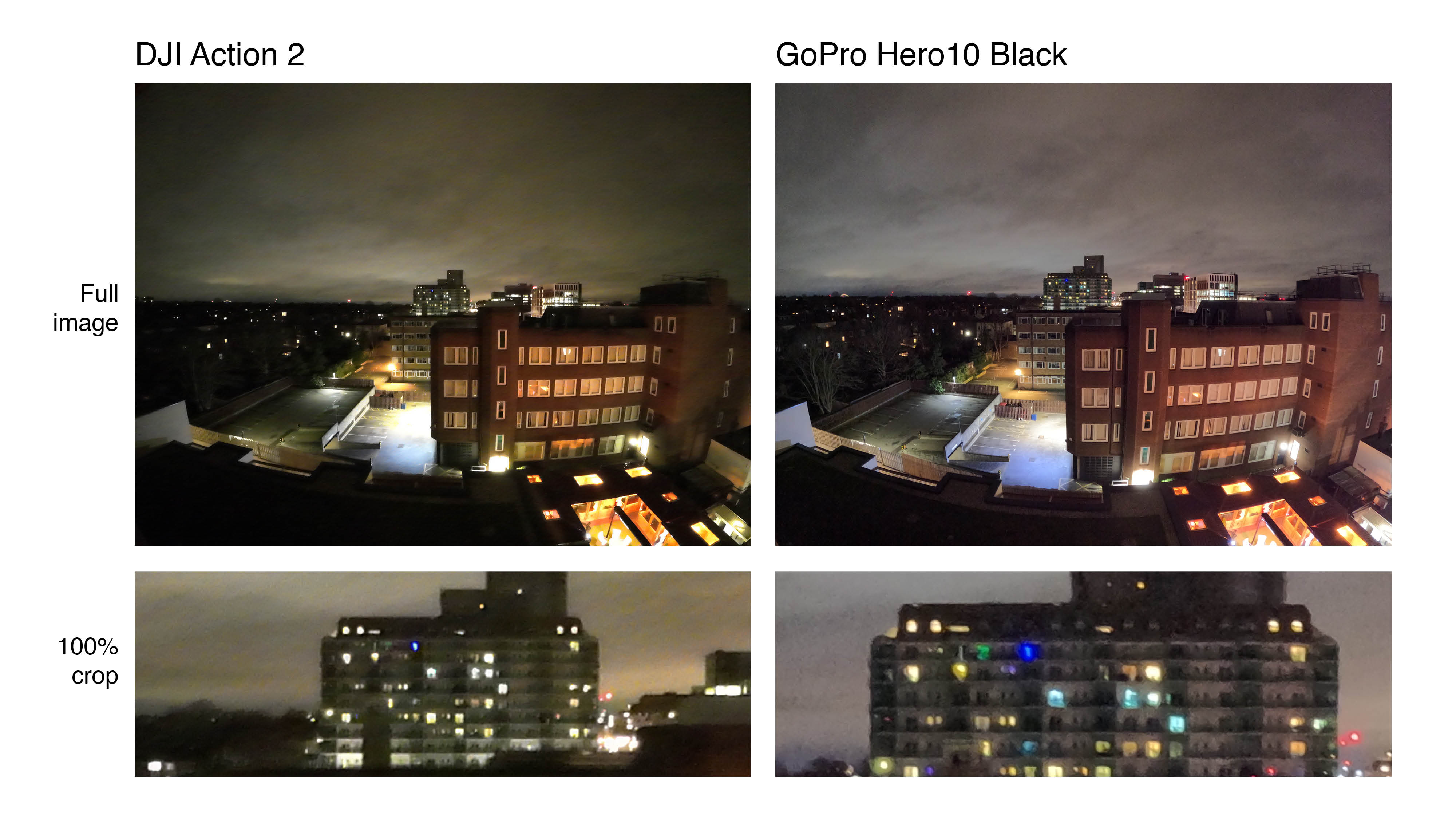
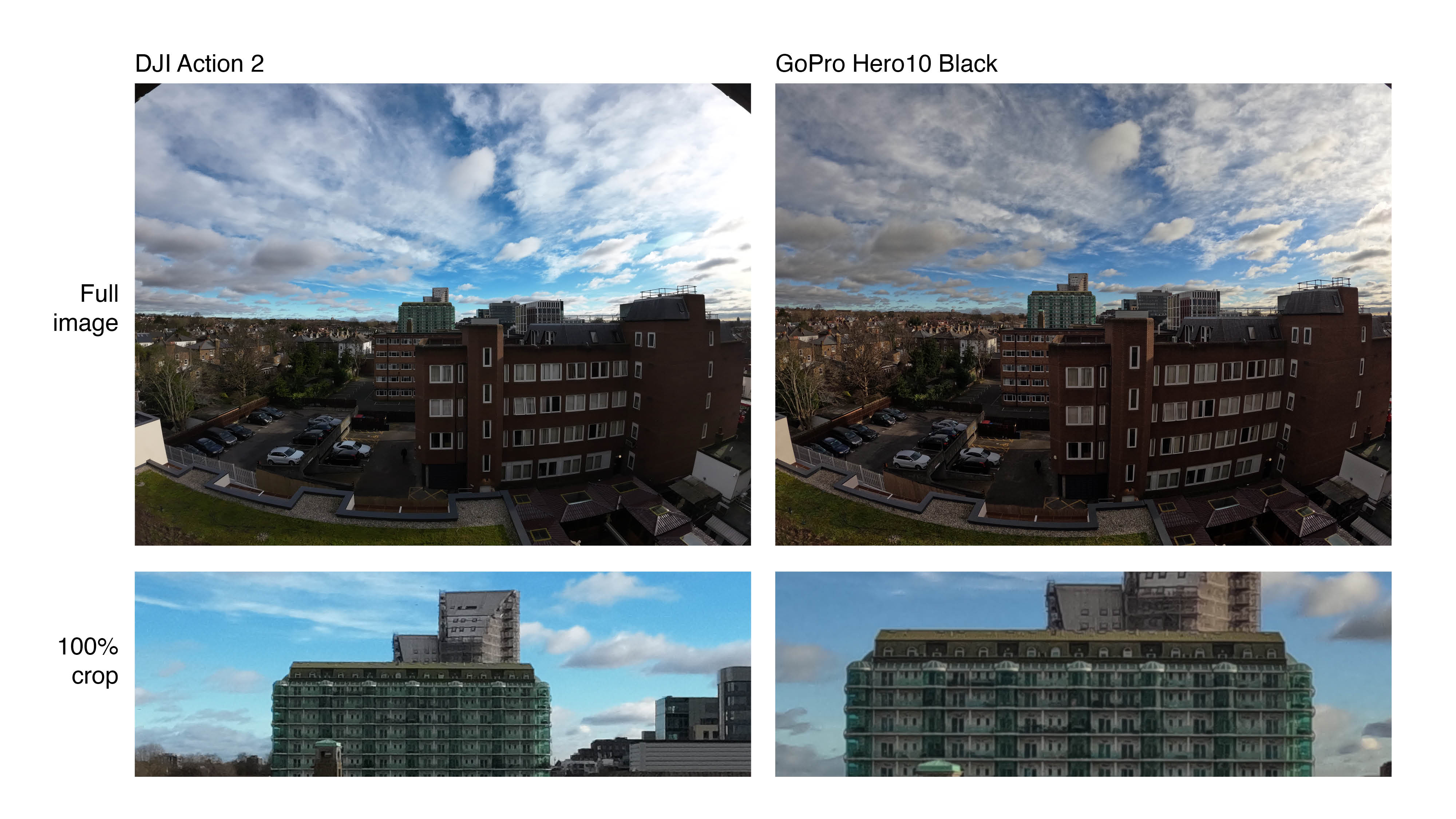
DJI Action 2 vs HERO 10 Black: price and verdict
As for price, you can get a load of different bundles of both cameras. Starting with DJI, if you pick up the Action 2 with the Power Combo (with a modular battery attachment and no selfie screen), that costs GBP £349 / USD $399 / AUD $609. If you're a vlogger, you'll want to pick up the Dual-Screen Combo which costs a fair chunk more at GBP £455 / USD $519 / AUD $799.
The GoPro HERO 10 Black is technically more expensive, costing GBP £479 / USD $549.98 / AUD $819.94 for the camera, or GBP £529 / USD $659.94 / AUD $989.74 for the camera with a bunch of accessories – a magnetic swivel clip, spare battery, short tripod, microSD card and a camera case. That said, get a GoPro subscription which costs GBP £49 / USD $49.99 / AUD $69.99 a year, and you can get the camera for as little as GBP £379 / USD $349.98 / AUD $529.95, taking the price in between the two DJI Action 2 options (head to our 'is a GoPro subscription worth it?' article for more on this).
As for an overall winner, while we prefer the DJI Action 2's design, it has a wider angle of view, and its Horizon Steady horizon levelling outperforms that of the HERO 10 Black, it doesn't quite stack up to the best from GoPro when it comes to image quality consistency – especially in low light. GoPro's HERO 10 Black also edges ahead in terms of usability, with its larger screen and more familiar ergonomics, making it our winning action camera.

Basil has been writing about tech for over 12 years, with bylines in TechRadar, Metro, Wired, and Digital Camera World – to name but a few titles. He expertly covers everything from mobile phones to smart devices, cameras, audio-visual hardware, and kitchen tech. In addition to his extensive journalism experience, Basil is also skilled in video production, content strategy, and vegan baking, and runs Tech[edit], a technology-focused YouTube channel.